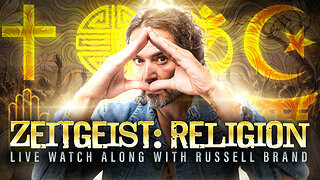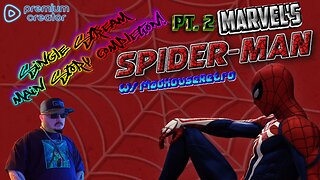Premium Only Content

Shooting From The Hip - 35 - Altered States Of Consciousness Trance Vision Quest
Altered States Of Consciousness - 5 altered states of consciousness Classification
1. Pathological (Epilepsy, brain damage)
2. Pharmacological (psychoactive substances)
3. Physical & physiological (fasting & sex)
4. Psychological (music, meditation, hypnosis)
5. Spontaneous (day-dreaming & near death experience)
altered state of consciousness: a change in one's average mental state as a result of trauma or accident or induced through meditation, drugs, some foods - The person is not unconscious - there are many common experiences that create altered states of consciousness (ASC): like sleep or daydreaming, sleep deprivation, euphoria or panic. Dream state, hypnosis, & meditation considered Altered States
Yoga introduces the concept of purusha, the eternal principle that activates the entire universe - Yoga is a means to achieve this goal of experiencing unitary consciousness - Unitary Consciousness: an unchanging reality that permeates all that we see around us
5 States of Consciousness 1. Awareness: the quality or state of being aware 2. Bias: prejudice in favor of or against one thing, person, or group compared with another 3. Consciousness: the state of being awake & aware of one's surroundings 4. Hypnosis: state of consciousness produced by hypnosis - induced state, persons apparently lose voluntary control of action & is highly responsive to suggestion or direction
5. Priming: a process theorized to occur when mental representations of concepts are activated by a person's exposure to something that those concepts are related to. This activation influences how the person responds to the concepts - such as by making the response quicker
6. Sleep: an active state of unconsciousness produced by the body when the brain is in a state of rest & is reactive primarily to internal stimulus
Dream consciousness occurs when the brain is activated during sleep; during REM sleep, that activation is as intense as it is in waking. At the same time, the input-output gates of the brain are actively closed & the chemical balance is shifted from aminergic (describe receptors that respond to amines or neurons that release noradrenaline, dopamine, or serotonin)
7. Trance: a state of semi-consciousness in which a person is not self-aware & is either altogether unresponsive to external stimuli (but nevertheless capable of pursuing & realizing an aim) or is selectively responsive in following the directions of the person (if any) who has induced the trance - this process is a form of altered states of consciousness (ASC) widely reported across cultures - entering these states is often linked to auditory stimuli such as singing, chanting, or rhythmic drumming - term trance can be associated with hypnosis, meditation, magic, flow, prayer, psychedelic drugs & altered states of consciousness - Hypnosis is a trance-like mental state in which people experience increased attention, concentration & suggestibility - Trance: earlier meaning "a dazed, half-conscious or insensible condition or state of fear"- Old French transe "fear of evil" - Latin transīre "to cross", "pass over" - Trance conditions include all the different states of mind, emotions, moods & daydreams that human beings experience - All activities & stimuli which engage a human involve the filtering of information coming into sense modalities & this influences brain function & consciousness - trance may be understood as a way for the mind to change the way it filters information in order to provide more efficient use of the mind's resources - Many traditions & rituals employ trance. Trance also has a function in religion & mystical experience - It may also happen without any known reason. The particular technique that an individual uses to induce ecstasy is usually one that is associated with that individual's particular religious & cultural traditions
Mystics: As the mystical experience of mystics generally entails direct connection, communication & communion with the divine; trance & cognitive experiences (Yoga, Sufism, Shaman, Kabbalah, Hasidism)
Vision Quest - an attempt to achieve a vision of a future guardian spirit, traditionally undertaken at puberty by boys of the Plains Indian peoples, typically through fasting or self-torture - rite of passage
supernatural experience in which an individual seeks to interact with a guardian spirit, usually an anthropomorphized animal, to obtain advice or protection. Vision quests were most typically found among the native peoples of North and South America
-
 1:06:10
1:06:10
Russell Brand
8 hours agoThe Greatest Lie Ever Told? - SF625
51.8K82 -
 LIVE
LIVE
GrimmHollywood
5 hours ago🔴LIVE • GRIMM HOLLYWOOD • SKATE EARLY ACCESS • BRRRAP PACK • READY OR NOT •
76 watching -
 LIVE
LIVE
SavageJayGatsby
2 hours agoLet's Play: Pacific Drive || $300 Weekly Goal - Spicy Bite Saturday || Teen Drinkin is Very Bad
39 watching -
 LIVE
LIVE
blackfox87
2 hours agoWe Back Baby!! | PREMIUM CREATOR | #DisabledVeteran
75 watching -
 LIVE
LIVE
MadHouse_
1 hour agoFinsihing up the Main story and then some DLC.
14 watching -
 1:41:06
1:41:06
vivafrei
5 hours agoTrump Changing Tune on Operation Warp Speed? CBC Promoting Propaganda? Shiloh Hendrix Update & MORE!
184K93 -
 LIVE
LIVE
The Mike Schwartz Show
3 hours agoTHE MIKE SCHWARTZ SHOW Evening Edition 09-01-2025
102 watching -
 46:25
46:25
The Quartering
7 hours agoMeta PC Winner, Trump Ruins Libs Dark Fantasy & Raja Jackson Case Heats Up!
135K59 -

StoneMountain64
6 hours agoNew Missions for Battlefield 6 Unlocks (+New Mouse and Keyboard)
40.3K1 -
 2:09:47
2:09:47
Nerdrotic
11 hours ago $6.72 earnedHollywood's Long Dark Summer of the Soul - Nerdrotic Nooner 511
77.4K4